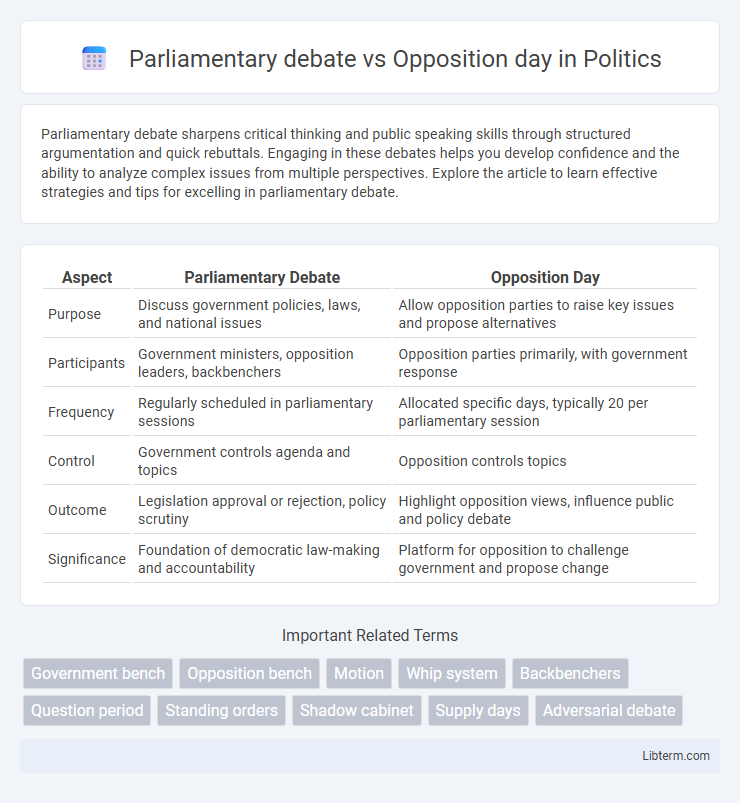Parliamentary debate sharpens critical thinking and public speaking skills through structured argumentation and quick rebuttals. Engaging in these debates helps you develop confidence and the ability to analyze complex issues from multiple perspectives. Explore the article to learn effective strategies and tips for excelling in parliamentary debate.
Table of Comparison
| Aspect | Parliamentary Debate | Opposition Day |
|---|---|---|
| Purpose | Discuss government policies, laws, and national issues | Allow opposition parties to raise key issues and propose alternatives |
| Participants | Government ministers, opposition leaders, backbenchers | Opposition parties primarily, with government response |
| Frequency | Regularly scheduled in parliamentary sessions | Allocated specific days, typically 20 per parliamentary session |
| Control | Government controls agenda and topics | Opposition controls topics |
| Outcome | Legislation approval or rejection, policy scrutiny | Highlight opposition views, influence public and policy debate |
| Significance | Foundation of democratic law-making and accountability | Platform for opposition to challenge government and propose change |
Introduction: Understanding Parliamentary Debate and Opposition Day
Parliamentary debate involves structured discussions where government and opposition teams argue on legislative motions, emphasizing formal rules and rhetoric. Opposition Day, observed in the UK Parliament, allows opposition parties to set the agenda and challenge government policies directly through debates on specific issues. This distinction highlights the procedural differences and strategic roles each plays within parliamentary democracy.
Defining Parliamentary Debate: Purpose and Structure
Parliamentary debate is a competitive format where teams discuss motions based on current events, emphasizing persuasive argumentation and quick thinking within a formal structure of opening speeches, rebuttals, and closing summaries. Opposition Day, primarily observed in parliamentary systems like the UK, designates specific days for opposition parties to set the agenda and propose debates, highlighting accountability and government scrutiny. While parliamentary debate is an educational and competitive activity, Opposition Day serves a political function within legislative processes.
What is Opposition Day? Origins and Significance
Opposition Day is a parliamentary session time allocated to opposition parties to propose motions and debate issues outside the ruling party's agenda, originating in the UK House of Commons to ensure democratic balance. It provides a structured opportunity for the opposition to highlight alternative policies and hold the government accountable, reinforcing parliamentary democracy. The established tradition underscores the significance of diverse political discourse and the vital role opposition plays in legislative processes.
Historical Evolution of Parliamentary Debates
Parliamentary debates originated in the early modern period as a formalized process of deliberation within legislative bodies, evolving significantly during the 17th century English Parliament with the establishment of structured rules and speaking orders. Opposition Day in parliamentary systems, introduced to give minority parties a designated opportunity to set the agenda, became a critical mechanism to ensure diverse political perspectives and accountability within government. The historical evolution of parliamentary debates reflects increasing complexity and democratization in legislative procedures, emphasizing transparency and the representation of varied political interests.
The Role of Opposition Day in Democratic Processes
Opposition Day plays a crucial role in democratic processes by allowing the minority parties to set the parliamentary agenda and raise issues that may not be prioritized by the ruling party, thereby enhancing government accountability. It provides an institutionalized platform for opposition parties to scrutinize government policies and propose alternative solutions, fostering a more transparent and responsive political environment. Unlike parliamentary debates that occur routinely, Opposition Day specifically empowers opposition voices to influence legislative focus and public discourse directly.
Key Differences: Parliamentary Debate vs Opposition Day
Parliamentary debate centers on structured argumentation between government and opposition teams within a formal legislative framework, emphasizing logical reasoning and public speaking skills. Opposition Day specifically refers to designated days in parliamentary systems when opposition parties set the agenda to challenge the government on specific policy issues, enabling focused scrutiny and debate. The key difference lies in parliamentary debate being a general format for discourse, while Opposition Day is a procedural event allowing the opposition to highlight grievances and propose alternatives.
Impact on Legislation and Policy Formation
Parliamentary debates provide a formal platform for comprehensive discussion of legislative proposals, facilitating detailed scrutiny and amendments that directly shape policy outcomes. Opposition Day allows the minority parties to highlight issues and propose alternative policies, exerting pressure on the government to reconsider or refine legislative priorities. Both mechanisms enhance democratic accountability by enabling diverse voices to influence the development and implementation of laws.
Participation: Government vs Opposition in Debates
Parliamentary debate formats emphasize active participation from both the Government and Opposition sides, where each team presents structured arguments and engages in refutation throughout the session. In Opposition Day debates, the focus shifts predominantly to the Opposition, granting them the opportunity to lead discussions and propose motions that challenge government policies. This format enables the Opposition to set the agenda and mobilize broader support, thereby enhancing their role in parliamentary scrutiny and accountability.
Contemporary Examples: Case Studies from Various Parliaments
Parliamentary debates often involve structured discussions on legislation where government and opposition members analyze policy impacts, such as the UK's Brexit debates highlighting economic and sovereignty concerns. Opposition Days, used in parliaments like India's Lok Sabha, provide opposition parties dedicated opportunities to set the agenda, exemplified by sessions addressing corruption allegations against the ruling party in 2018. Contemporary case studies from Australia reveal how Opposition Days facilitated debates on climate change policy, showcasing the role of parliamentary mechanisms in democratic scrutiny.
Conclusion: Assessing the Future of Parliamentary Debate and Opposition Day
Parliamentary debate continues to evolve as a vital platform for democratic discourse, promoting critical thinking and public engagement on legislative matters. Opposition Day remains crucial in holding the government accountable, providing a structured opportunity to challenge policies and propose alternatives. The future of both Parliamentary debate and Opposition Day hinges on their ability to adapt to emerging political dynamics and enhance transparency in governance.
Parliamentary debate Infographic

 libterm.com
libterm.com